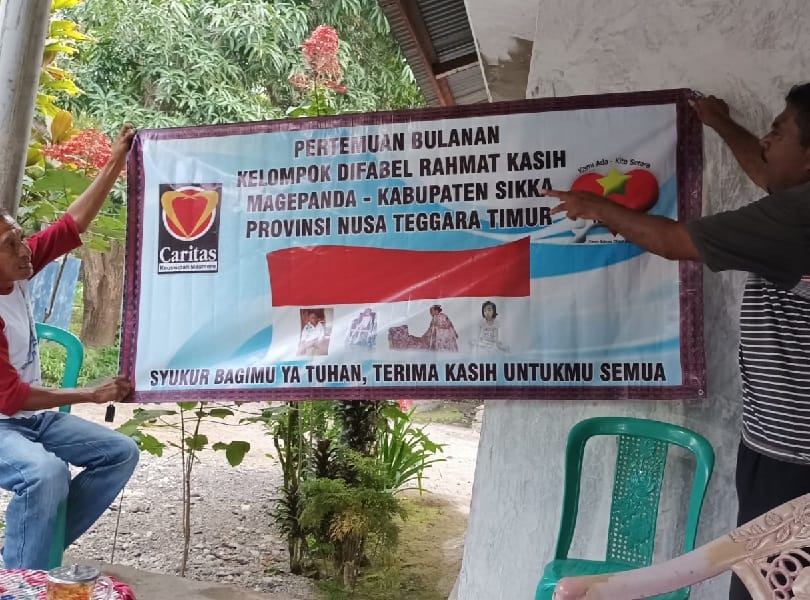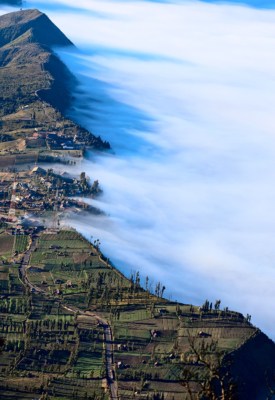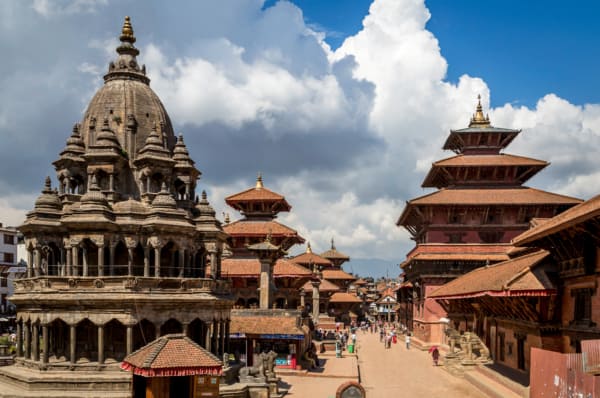Image: Two people hold up a sign advertising monthly meetings for a group for persons with disability.
Over the last few months, the research team for DLP’s ‘Disability Leadership in Indonesia’ research project has been busy interviewing disability activists and advocates across the country to find out how they are leading change in their communities. In January 2022, one of the team, Ishak Salim, travelled to eastern Indonesia to meet with disability leaders there. Ishak documented the trip in this blog, an edited version of which is presented below. The research team will now begin the process of analysing all the data they have collected.
The island of Flores in remote eastern Indonesia is not where you would expect to find dynamic leaders advocating for disability rights. But that hasn’t stopped the people I met from working to bring people with disabilities together to help them access medical and other assistance, earn a living, and understand and advocate for their rights.
Map showing the location of Flores.
A community-level disability movement
I flew into Maumere, on the north coast of Flores, on a bright Saturday morning. After a short drive into town, I spent the afternoon talking to disability advocates from local Disabled Persons Organisation Nian Sikka Disability Benevolent Forum (Forsadika) and the team from Caritas Maumere Diocese. They explained the work that Caritas and Forsadika had been doing to raise awareness about disability rights among village and district leaders. They had also helped establish groups for persons with disability in local villages. These groups are now formal village-level organisations, which means they can access local government funding to support members.
One of the people spearheading this work is Ambrosius Dan, or Ambros, as he likes to be called, a former member of the local parliament (pictured below left on the verandah of his home). The next day, after the Sunday church service, I visited Ambros and his wife, Lily, at their modest home. Over a meal of grilled fish and tangy vegetable soup, Ambros talked about how he adapted to the loss of his sight, how he and other activists had set up Forsadika, and how the organisation had grown to a network of 450 members across 25 communities. Now a member of the advisory board, Ambros sees his role as being to support Forsadika’s Director and management team as they continue to grow and consolidate the organisation.
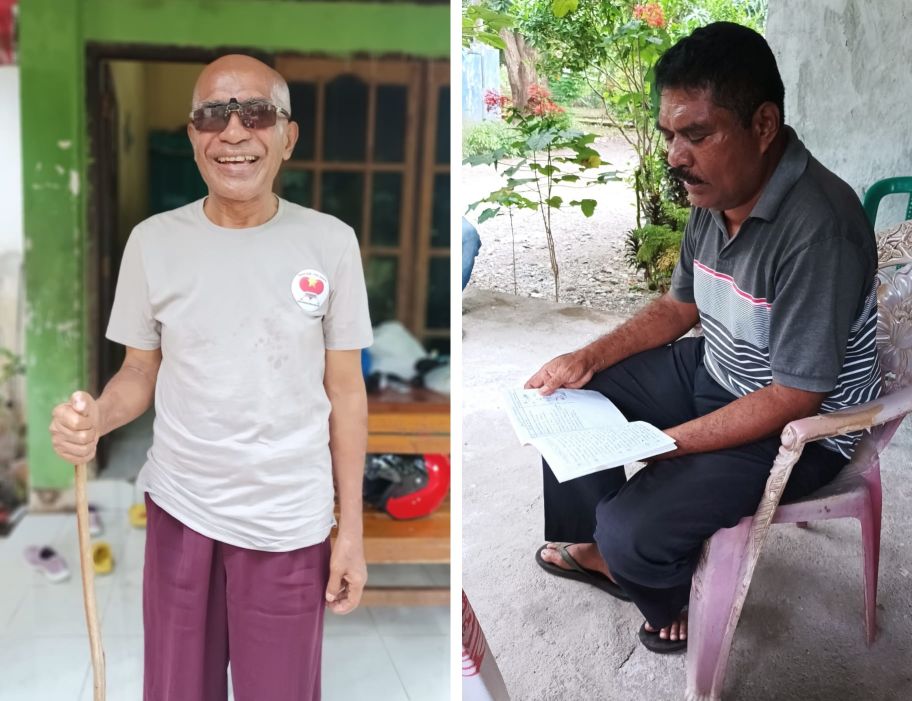
On the left, Ambros smiles for a photograph on the front verandah of his home, on the right, Hery sits with a guestbook). Image credit: Ishak Salim.
After an early evening walk around Ledalero seminary, and a hike up Keling Hill to see the famous statue of the Virgin Mary, I drove to the coastal village of Magepanda to meet with Hery (pictured above right with a guestbook showing visitors to the group). After a stroke several years ago, Hery had met members of Forsadika, who had suggested that he set up a group in his village. He spoke passionately about the stigma that people with disability face, and the need to change how people see persons with disability. Hery spends a lot of time with village leaders and local priests talking about disability rights. It’s difficult work at times, but he’s confident that bit by bit, things will change.
Weaving a brighter future
From Maumere, I travelled west to Ende, winding around the steep mountain roads, stopping briefly at Mount Kelimutu to see the colourful crater lakes. In Ende I met the Director of the Ende Disability Association, Kristina Pero, who introduced herself as ‘Mama Tin’. Before becoming the Director last year, Mama Tin had volunteered with Caritas Ende, organising medical assistance, registering persons with disability for government support, and setting up community-level groups. These groups now function as savings and loans associations: members make regular contributions, and the ‘pot’ can then be used to take out loans to develop a small business. The groups also receive grants from the local government and NGOs.
In the afternoon, Mama Tin took us to visit members of some of these groups. Ima and Martha (pictured below with Mama Tin, left) have set up a traditional weaving business. The woven cloth takes many weeks to produce and can be sold for a good price in the market.
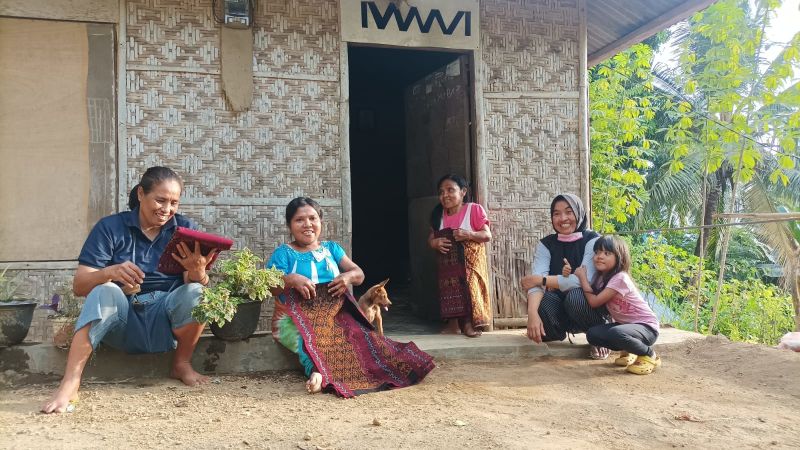
Ima and Martha (with Mama Tin left) with the woven cloth they make. Image credit: Ishak Salim.
After a 6-month training course at a government training centre for persons with disability in Makassar, Jois (pictured below right) and Ardian (pictured below left) have taken out a loan to set up an electronics repair shop.
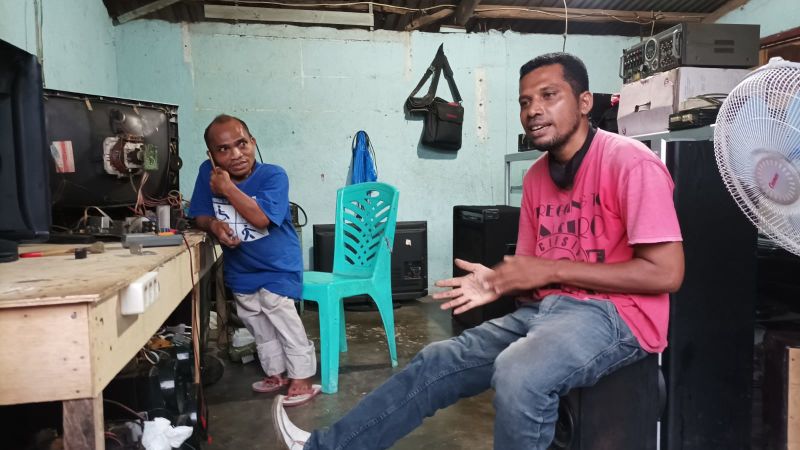
Adrian (left) and Jois (right) have set up an electronics repair shop. Image credit: Ishak Salim.
Mama Tin is hopeful that these small businesses can provide them with a more secure income.
Coffee with Simon
Labuan Bajo, on the western tip of Flores, is a major tourist destination, famous for its spectacular diving and for the giant Komodo dragons which live on a small island just off the coast.
From the airport, I drove up into the cool hills to meet with Simon and his wife (pictured below), who run a small massage clinic from their house.
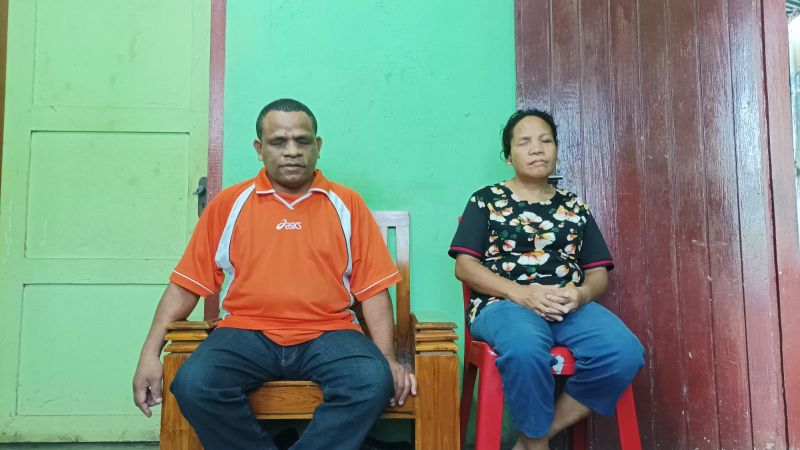
Simon and his wife. Image credit: Ishak Salim.
Over a cup of Flores’ signature Bajawa coffee, Simon told me that as a child growing up in Biak, in Papua, he would help his family catch fish at the beach. Like many others at that time, they used fish bombs. Unfortunately, a bomb exploded in Simon’s hand, and the shards damaged his eyes.
Simon attended a school for children with disabilities in Biak before continuing his education and training at the Wyata Guna Centre for the Blind in Bandung, in West Java. He moved to Labuan Bajo, his wife’s home town, 15 years ago. Apart from running the massage clinic, both Simon and his wife have been active in the local disability movement. A few years ago, they helped establish a new organisation, the Labuan Bajo Indonesian Disabled Persons Association, of which Simon is the Director. The organisation is still growing, but Simon has high hopes for the role it can play in strengthening the movement for disability rights in Flores.
The disability leaders here in Flores have been so warm and welcoming, and so willing to share their experiences. I’m looking forward to sharing what I’ve learned with friends and fellow activists back home.
Would you like to find out more about how Indonesia’s disability activist community have used technology to work together during Covid-19? Check out our summary, Leadership in the shadow of the pandemic.

